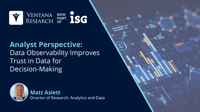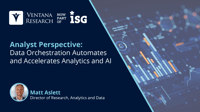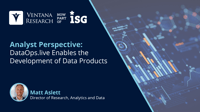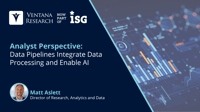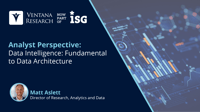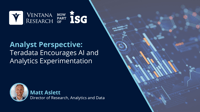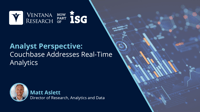Enterprises are embracing the potential for artificial intelligence (AI) to deliver improvements in productivity and efficiency. As they move from initial pilots and trial projects to deployment into production at scale, many are realizing the importance of agile and responsive data processes, as well as tools and platforms that facilitate data management, with the goal of improving trust in the data used to fuel analytics and AI. This has led to increased attention on the role of data...
Read More
Topics:
data operations,
AI & Machine Learning,
Analytics & Data
The emergence of generative artificial intelligence (GenAI) has significant implications at all levels of the technology stack, not least analytics and data products, which serve to support the development, training and deployment of GenAI models, and also stand to benefit from the advances in automation enabled by GenAI. The intersection of analytics and data and GenAI was a significant focus of the recent Google Cloud Next ’24 event. My colleague David Menninger has already outlined the key...
Read More
Topics:
Analytics,
natural language processing,
AI & Machine Learning,
data platforms,
Analytics & Data,
Generative AI
I recently wrote about the development, testing and deployment of data pipelines as a fundamental accelerator of data-driven strategies as well as the importance of data orchestration to accelerate analytics and artificial intelligence. As I explained in the recent Data Observability Buyers Guide, data observability software is also a critical aspect of data-driven decision-making. Data observability addresses one of the most significant impediments to generating value from data by providing an...
Read More
Topics:
Analytics,
Data Ops,
data operations,
AI & Machine Learning,
Analytics & Data,
Generative AI,
Machine Learning Operations
I recently wrote about the development, testing and deployment of data pipelines as a fundamental accelerator of data-driven strategies. As I explained in the 2023 Data Orchestration Buyers Guide, today’s analytics environments require agile data pipelines that can traverse multiple data-processing locations and evolve with business needs.
Read More
Topics:
Analytics,
data operations,
AI & Machine Learning,
data platforms,
Analytics & Data,
Generative AI,
Data Intelligence
I wrote recently about the role that data intelligence has in enabling enterprises to facilitate data democratization and the delivery of data as a product. Data intelligence provides a holistic view of how, when, and why data is produced and consumed across an enterprise, and by whom. This information can be used by data teams toensure business users and data analysts are provided with self-service access to data that is pertinent to their roles and requirements. Delivering data as a product...
Read More
Topics:
Analytics,
Data Ops,
data operations,
AI & Machine Learning,
data platforms,
Analytics & Data,
GenAI,
Data Intelligence
The development, testing and deployment of data pipelines is a fundamental accelerator of data-driven strategies, enabling enterprises to extract data from the operational applications and data platforms designed to run the business and load, integrate and transform it into the analytic data platforms and tools used to analyze the business. As I explained in our recent Data Pipelines Buyers Guide, data pipelines are essential to generating intelligence from data. Healthy data pipelines are...
Read More
Topics:
Analytics,
AI,
data operations,
AI & Machine Learning,
data platforms,
Analytics & Data,
Data Intelligence
As enterprises seek to increase data-driven decision-making, many are investing in strategic data democratization initiatives to provide business users and data analysts with self-service access to data across the enterprise. Such access has long been a goal of many enterprises, but few have achieved it. Only 15% of participants in Ventana Research’s Analytics and Data Benchmark Research say their organization is very comfortable allowing business users to work with data that has not been...
Read More
Topics:
Analytics,
data operations,
AI & Machine Learning,
Analytics & Data,
Data Intelligence,
Data Products,
Data Democratization
Cloud computing has had an enormous impact on the analytics and data industry in recent decades, with the on-demand provisioning of computational resources providing new opportunities for enterprises to lower costs and increase efficiency. Two-thirds of participants in Ventana Research’s Data Lakes Dynamic Insightsresearch are using a cloud-based environment as the primary data platform for analytics.
Read More
Topics:
Analytics,
AI,
AI & Machine Learning,
data platforms,
Analytics & Data,
Generative AI,
Data Intelligence
I have previously written about the impact of intelligent operational applications on the requirements for data platforms. Intelligent applications are used to run the business but also deliver personalization, recommendations and other features generated by machine learning and artificial intelligence. As such, they require a combination of operational and analytic processing functionality. The emergence of these intelligent applications does not eradicate the need for separate analysis of...
Read More
Topics:
Analytics,
Artificial intelligence,
AI & Machine Learning,
data platforms,
Analytics & Data,
Generative AI
The increasing importance of intelligent operational applications driven by artificial intelligence (AI) is blurring the lines that have traditionally divided the requirements between operational and analytic data platforms. Operational data platforms have traditionally been deployed to support applications targeted at business users and decision-makers to run the business, with analytic data platforms typically supporting applications used by data and business analysts to analyze the business.
Read More
Topics:
embedded analytics,
Cloud Computing,
AI & Machine Learning,
Analytics & Data,
analytic data platforms,
Operational Data Platforms




